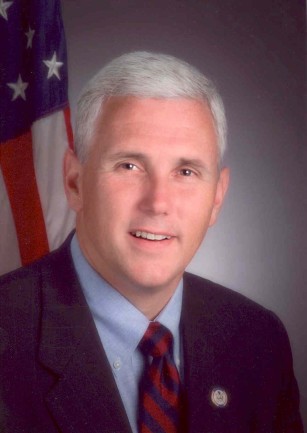This week, Rep. Mike Pence (R-IN) not only lied twice on national television about the cost of a green economy, but also accused the MIT economist who has challenged Pence’s distortion of his work of playing politics. Since March, the GOP has repeated a $3000 lie about about cap-and-trade clean energy legislation, claiming that the analysis came from an MIT study. Even though economist John Reilly, a co-author of the study, has sent multiple letters to the GOP telling them their distortion is “just wrong” and asking them to stop misrepresenting his work, they ignored his requests. This afternoon, the Wonk Room interviewed Pence about Reilly’s attempts to correct the false portrayals of his own study. When asked if Reilly was wrong, Rep. Mike Pence (R-IN) accused the economist of “making a public policy or political conclusion”:
I respect the work that he did. We took the number that he used [for the value of the cap-and-trade market] and divided it by the number of the households. What he’s doing, he’s not making a mathematical conclusion, he’s making a public policy or political conclusion. He believes the other side’s analysis that there’ll going to be a rebate of these revenues and job growth.
Watch it:
This morning, after MSNBC’s Joe Scarborough asked him about the GOP plan for a green economy, Pence instead repeated the $3000 lie. Pence then led a Republican mock hearing on energy policy to attack the Waxman-Markey American Clean Energy and Security Act, where the Wonk Room interview took place. Pence then appeared on MSNBC an hour later and repeated the lie in an interview with Andrea Mitchell. Neither Scarborough nor Mitchell challenged Pence for quoting the repeatedly debunked statistic.
Yet again, Pence is “just wrong.” In fact, Reilly, a widely respected energy economist, was “making a mathematical conclusion” when he told the House Republicans their $3000 figure was a fabrication. Asserting that the value of the market is equivalent to the economic cost of the policy — which one has to do to claim that the cost of cap and trade is $3100 per household — requires the assumption that value of the market magically disappears somewhere. Pence is not correct when he makes the argument that the lack of economic detail in the Waxman-Markey American Clean Energy and Security Act permits this distortion. Reilly attempted to explain this to the Weekly Standard:
It is not really a matter of returning it or not, no matter what happens this revenue gets recycled into the economy some way.
Furthermore, Reilly has explained that the MIT study shouldn’t be used to analyze Waxman-Markey at all. Even “apart from the misrepresentation of the costs” by the GOP, Reilly told Climate Progress last week, “it is inappropriate to draw conclusions on the costs of Waxman-Markey” from a study published two years ago that doesn’t model key cost-containment provisions, such as the use of offsets.
Update: In an interview with the Wonk Room, Rep. John Shimkus (R-IL) says he’s “glad” economist John Reilly objected, because now Shimkus will use a $3900 figure constructed by the Weekly Standard in response:



